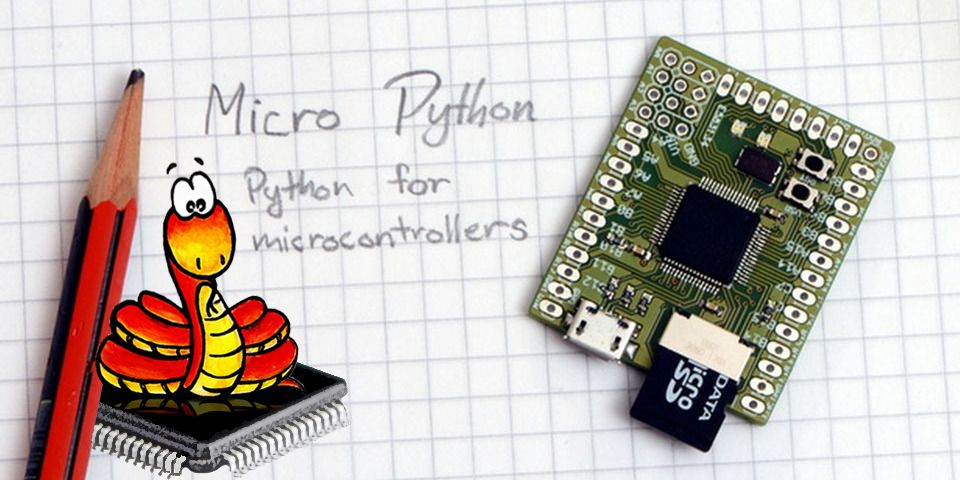|
|
||
|---|---|---|
| bare-arm | ||
| cc3200 | ||
| docs | ||
| drivers | ||
| esp8266 | ||
| examples | ||
| extmod | ||
| lib | ||
| logo | ||
| minimal | ||
| mpy-cross | ||
| pic16bit | ||
| py | ||
| qemu-arm | ||
| stmhal | ||
| teensy | ||
| tests | ||
| tools | ||
| unix | ||
| windows | ||
| zephyr | ||
| .gitattributes | ||
| .gitignore | ||
| .gitmodules | ||
| .travis.yml | ||
| ACKNOWLEDGEMENTS | ||
| CODECONVENTIONS.md | ||
| CONTRIBUTING.md | ||
| LICENSE | ||
| README.md | ||
README.md
[![Build Status][travis-img]][travis-repo] [![Coverage Status][coveralls-img]][coveralls-repo] [travis-img]: https://travis-ci.org/micropython/micropython.png?branch=master [travis-repo]: https://travis-ci.org/micropython/micropython [coveralls-img]: https://coveralls.io/repos/micropython/micropython/badge.png?branch=master [coveralls-repo]: https://coveralls.io/r/micropython/micropython?branch=master
The MicroPython project

This is the MicroPython project, which aims to put an implementation of Python 3.x on microcontrollers and small embedded systems. You can find the official website at micropython.org.
WARNING: this project is in beta stage and is subject to changes of the code-base, including project-wide name changes and API changes.
MicroPython implements the entire Python 3.4 syntax (including exceptions, "with", "yield from", etc., and additionally "async" keyword from Python 3.5). The following core datatypes are provided: str (including basic Unicode support), bytes, bytearray, tuple, list, dict, set, frozenset, array.array, collections.namedtuple, classes and instances. Builtin modules include sys, time, and struct, etc. Select ports have support for _thread module (multithreading). Note that only subset of Python 3.4 functionality implemented for the data types and modules.
See the repository www.github.com/micropython/pyboard for the MicroPython board (PyBoard), the officially supported reference electronic circuit board.
Major components in this repository:
- py/ -- the core Python implementation, including compiler, runtime, and core library.
- unix/ -- a version of MicroPython that runs on Unix.
- stmhal/ -- a version of MicroPython that runs on the PyBoard and similar STM32 boards (using ST's Cube HAL drivers).
- minimal/ -- a minimal MicroPython port. Start with this if you want to port MicroPython to another microcontroller.
- tests/ -- test framework and test scripts.
- docs/ -- user documentation in Sphinx reStructuredText format.
Additional components:
- bare-arm/ -- a bare minimum version of MicroPython for ARM MCUs. Used mostly to control code size.
- teensy/ -- a version of MicroPython that runs on the Teensy 3.1 (preliminary but functional).
- pic16bit/ -- a version of MicroPython for 16-bit PIC microcontrollers.
- cc3200/ -- a version of MicroPython that runs on the CC3200 from TI.
- esp8266/ -- an experimental port for ESP8266 WiFi modules.
- tools/ -- various tools, including the pyboard.py module.
- examples/ -- a few example Python scripts.
The subdirectories above may include READMEs with additional info.
"make" is used to build the components, or "gmake" on BSD-based systems. You will also need bash and Python (at least 2.7 or 3.3).
The Unix version
The "unix" port requires a standard Unix environment with gcc and GNU make. x86 and x64 architectures are supported (i.e. x86 32- and 64-bit), as well as ARM and MIPS. Making full-featured port to another architecture requires writing some assembly code for the exception handling and garbage collection. Alternatively, fallback implementation based on setjmp/longjmp can be used.
To build (see section below for required dependencies):
$ cd unix
$ make axtls
$ make
Then to give it a try:
$ ./micropython
>>> list(5 * x + y for x in range(10) for y in [4, 2, 1])
Use CTRL-D (i.e. EOF) to exit the shell.
Learn about command-line options (in particular, how to increase heap size
which may be needed for larger applications):
$ ./micropython --help
Run complete testsuite:
$ make test
Unix version comes with a builtin package manager called upip, e.g.:
$ ./micropython -m upip install micropython-pystone
$ ./micropython -m pystone
Browse available modules on PyPI. Standard library modules come from micropython-lib project.
External dependencies
Building Unix version requires some dependencies installed. For
Debian/Ubuntu/Mint derivative Linux distros, install build-essential
(includes toolchain and make), libffi-dev, and pkg-config packages.
Other dependencies can be built together with MicroPython. Oftentimes, you need to do this to enable extra features or capabilities. To build these additional dependencies, first fetch git submodules for them:
$ git submodule update --init
Use this same command to get the latest versions of dependencies, as
they are updated from time to time. After that, in unix/ dir, execute:
$ make deplibs
This will build all available dependencies (regardless whether they
are used or not). If you intend to build MicroPython with additional
options (like cross-compiling), the same set of options should be passed
to make deplibs. To actually enabled use of dependencies, edit
unix/mpconfigport.mk file, which has inline descriptions of the options.
For example, to build SSL module (required for upip tool described above),
set MICROPY_PY_USSL to 1.
In unix/mpconfigport.mk, you can also disable some dependencies enabled
by default, like FFI support, which requires libffi development files to
be installed.
The STM version
The "stmhal" port requires an ARM compiler, arm-none-eabi-gcc, and associated bin-utils. For those using Arch Linux, you need arm-none-eabi-binutils and arm-none-eabi-gcc packages. Otherwise, try here: https://launchpad.net/gcc-arm-embedded
To build:
$ cd stmhal
$ make
You then need to get your board into DFU mode. On the pyboard, connect the 3V3 pin to the P1/DFU pin with a wire (on PYBv1.0 they are next to each other on the bottom left of the board, second row from the bottom).
Then to flash the code via USB DFU to your device:
$ make deploy
This will use the included tools/pydfu.py script. If flashing the firmware
does not work it may be because you don't have the correct permissions, and
need to use sudo make deploy.
See the README.md file in the stmhal/ directory for further details.